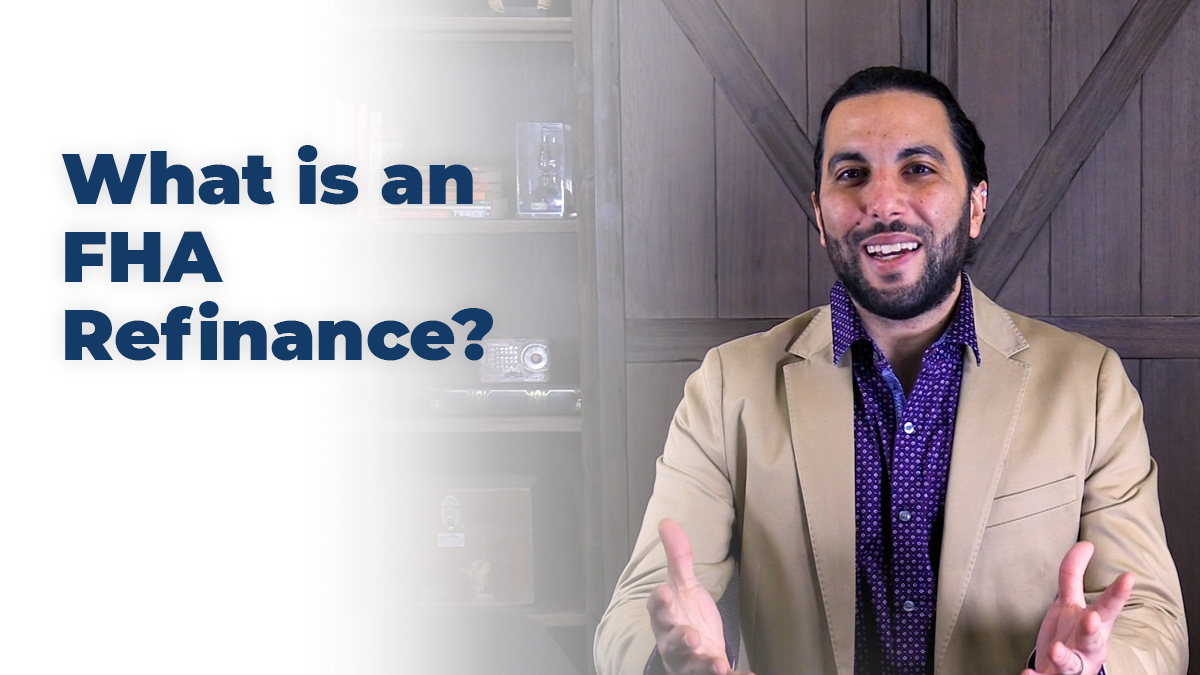In this article
What is an FHA refinance loan?
The FHA loan program has been more popular than ever the last few years as credit has become harder to get. FHA loans are one of the best options available for borrowers that would like to refinance their mortgage to get a better deal or to pay off debt. FHA loans are known as an easy loan to qualify due to the flexible credit guidelines and the low equity requirements. Getting FHA loans is popular for home buyers who have been through a financial credit event like a short sale, foreclosure or other financial hardship over the life of the loan in the past and are looking to get their finances back on track.

Watch Now
Why apply for a FHA refinance?
FHA refinance programs are designed to help borrowers with existing FHA loans lower their monthly mortgage payments or access equity in their homes. Here are some reasons why you might consider applying for an FHA refinance:
Lower Interest Rates: One of the primary reasons to refinance an FHA loan is to take advantage of lower interest rates. If market interest rates have dropped since you initially obtained your FHA loan, refinancing can help you secure a new loan with a lower interest rate, potentially reducing your monthly payments.
Reduced Monthly Payments: By refinancing your FHA loan, you may be able to extend the loan term, resulting in lower monthly mortgage payments. This can be especially helpful if you are facing financial challenges or want to improve your cash flow.
Convert from Adjustable Rate to Fixed Rate: If you have an FHA adjustable-rate mortgage (ARM) and are concerned about rising interest rates, you can refinance to a fixed-rate FHA loan to provide stability in your monthly payments.
Cash-Out Refinance: FHA offers cash-out refinance options, allowing you to tap into your home equity. This is useful for making home improvements, paying off high-interest debt, or covering significant expenses, like education or medical bills.
Streamline Refinance: The FHA Streamline Refinance program is a simplified process designed to make it easier for existing FHA borrowers to refinance their loans. It requires less documentation and can often be completed with minimal credit and appraisal requirements, making it a convenient option for those looking to lower their interest rates or monthly payments.
Debt Consolidation: If you have high-interest debts, such as credit card balances or personal loans, you can use an FHA cash-out refinance to consolidate these debts into a single, lower-interest mortgage, potentially saving you money.
Mortgage Insurance Premium Reduction: Depending on when you initially obtained your FHA loan, the mortgage insurance premiums (MIP) you pay may be higher than the current rates. Refinancing your FHA loan may allow you to reduce your MIP payments.
Home Improvement: FHA offers 203(k) renovation loans that can be used to finance home improvements when you refinance. This is particularly useful if you want to purchase a fixer-upper and make necessary repairs or upgrades.
How does an FHA refinance loan work?
An FHA Refinance Loan can be an FHA Streamline Refinance or an FHA Cash-Out Refinance. It offers borrowers an opportunity to modify their loans under certain conditions. To qualify, borrowers must meet specific eligibility criteria, such as maintaining a history of on-time payments and having an existing FHA loan for the streamline option. The option simplifies the process, requiring minimal documentation and often no appraisal, focusing on lowering monthly payments or interest rates. On the other hand, the Cash-Out Refinance allows homeowners to access their home’s equity, requiring additional steps to qualify.
Who qualifies for FHA refinance?
Here are some common eligibility criteria for FHA refinancing:
Existing FHA Loan: To qualify for an FHA refinance, you typically need to have an existing FHA-insured loan although there are cases where this is not required.
Loan-to-Value (LTV) Ratio: The maximum LTV ratio allowed for FHA refinances can vary depending on the specific program. In general, your new loan amount should not exceed a certain percentage of the appraised value of your home.
Credit Score: While the FHA has more lenient credit score requirements compared to conventional loans, your credit history still matters. 620 or higher is ideal. A higher credit score makes it easier to qualify for competitive interest rates and terms.
Income and Employment: You will need to demonstrate sufficient income and stable employment. The lender will assess your ability to repay the new loan.
Payment History: A good payment history on your existing FHA loan is important. Late payments in the last 12 months can make it more difficult to qualify for an FHA refinance.
Mortgage Insurance: If your existing FHA loan has mortgage insurance, you’ll typically need to continue paying it on the new loan. The FHA offers both rate-and-term refinances (which can lower your interest rate) and cash-out refinances (which allow you to take cash out of your home equity). The eligibility criteria and mortgage insurance requirements can differ between these types of refinances.
Property Type: The FHA has guidelines for the types of properties that are eligible for its programs. Property must be your primary residence.
Loan Limits: FHA loan programs have maximum loan limits that can vary by location. Your new loan amount must fall within these limits.
Types of FHA refinances loans
Here is a brief summary of the FHA refinance types and the best features of each of them.
FHA Cash Out Refinance
The FHA Cash Out is one of many excellent loan options to refinance an FHA mortgage that lets you leverage the equity you have in your home to be able to pay off debt, consolidate a mortgage or simply pull out cash. It’s one of the most effective ways to consolidate high interest credit cards debt rate debt one low fixed rate mortgage payment per month which may be tax deductible.
FHA Cash-Out Refinance Features:
- Flexible guidelines
- Cashout up to 80% LTV
- Primary residence only
- Defer two mortgage payments
- Get an escrow refund (property taxes and insurance)
- Less paperwork
- Competitive Interest Rates
FHA (Federal Housing Administration) Streamline Refinance
The FHA Streamline Refinance is a special program specifically designed for borrowers who have an existing loan on FHA to be able to refinance with reduced documentation. FHA Streamlines are the easiest way to lower your mortgage monthly payments without having to verify a lot of information. That’s why the FHA Streamline is the most popular way to refinance an FHA today.
FHA Streamline Features:
- No appraisal required
- No income check
- Defer two mortgage payments
- Get an escrow refund (property taxes and insurance)
- Flexible FHA Guidelines.
- Close in 2 weeks
- Competitive Interest Rates.
- Quick Closings
It’s important to note that FHA refinance loans have specific rules and requirements that borrowers must follow. The eligibility and terms of an FHA refinance can vary, so it’s advisable to work closely with an FHA-approved lender who can guide you through the process and help you determine if an FHA refinance is the right option for your financial goals.

Are You Ready to Make a Move?
It's FREE and takes less than a minute to see what you could get.
